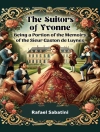In ‘Henner, ‘ François Crastre weaves a poignant tapestry of existential exploration and psychological depth, presenting a narrative that delves into the complexities of identity and the human condition. Employing a prose style that is both lyrical and stark, Crastre artfully juxtaposes moments of introspection with the chaotic pulse of modernity, drawing readers into a world where the boundaries between self and other begin to blur. The novel’s rich allusions to contemporary philosophical discourse situate it within a broader literary context, reflecting the influences of postmodern thought while also engaging with timeless questions of authenticity and belonging. François Crastre, a prominent voice in contemporary literature, draws upon his diverse background in philosophy and sociology, which undoubtedly informs the intricate layers of Henner’s narrative. Having spent years examining the interplay between societal constructs and individual agency, Crastre’s writing reflects his keen observations of the human psyche, leading to a deep examination of what it means to be truly oneself in a world rife with external pressures. This compelling novel is highly recommended for readers seeking a profound engagement with themes of identity and modern alienation. ‘Henner’ is not just a story; it is an invitation to reflect on one’s own existence, making it an essential addition to the library of anyone intrigued by the search for meaning in an often confounding world.
เกี่ยวกับผู้แต่ง
François Crastre’s contributions to the literary world are encapsulated by his evocative storytelling and nuanced understanding of human emotions, particularly exhibited in his book ‘Henner’. Crastre, a figure nestled within the tapestry of French literature, may not be as widely recognized as his contemporaries; however, his work offers readers a glimpse into the minds and mores of his characters with a finesse that secures his place as a noteworthy author. His narrative style is characterized by a meticulous attention to detail and a profound exploration of the human condition, features that both enchant and educate his audience. While information about his life, including dates of birth and death, may not be readily available, his literary output remains a testament to his skill as a writer and his ability to create a world within the pages of his books that resonates with authenticity and emotion. As ‘Henner’ and other works by Crastre grace the shelves of those who appreciate early 20th-century French literature, they continue to offer a window into the era and the minds of its people through the immersive experiences fashioned by Crastre’s literary craftsmanship.












